
Resonancias
Scope & Guideline
Innovating Perspectives in Music Studies.
Introduction
Aims and Scopes
- Latin American Musicology:
A core focus on the musicological study of Latin American musical traditions, including historical, cultural, and social dimensions. - Cultural Identity and Expression:
Exploration of how music serves as a medium for expressing cultural identities, particularly in the context of Latin American societies. - Transcultural Influences:
Investigation into the interactions and exchanges between different musical traditions, particularly the influence of European music on Latin American compositions. - Social and Political Contexts of Music:
Analysis of how music reflects and responds to political movements, social changes, and cultural shifts within Latin America. - Pedagogical Approaches in Music:
Discussion of educational practices and methodologies in the teaching of music, particularly in higher education and conservatories. - Gender Studies in Music:
An examination of gender dynamics within the music industry and music education, focusing on the representation and roles of women in music.
Trending and Emerging
- Interdisciplinary Approaches:
An increasing trend towards interdisciplinary studies that combine musicology with cultural studies, sociology, and political science to provide a holistic understanding of musical phenomena. - Social Justice and Music:
A notable rise in research addressing the role of music in social justice movements, reflecting a growing interest in how music can impact societal change. - Digital Humanities in Musicology:
Emerging themes around the use of digital tools and methodologies in the study of music, including the analysis of digital archives and online music communities. - Exploration of Marginalized Voices:
A focus on the representation and contributions of marginalized groups within music, such as indigenous populations and Afro-descendant communities, is gaining prominence. - Contemporary Music Practices:
Increased attention on contemporary music practices, including new genres and the impact of technology on musical creation and dissemination.
Declining or Waning
- Historical Music Genres:
There seems to be a decreasing focus on in-depth studies of historical music genres that do not directly relate to contemporary issues or cultural identities. - Traditional Music Practices:
Research on traditional music practices, particularly those that do not intersect with modern interpretations or social movements, is becoming less frequent. - Eurocentric Musicology:
There is a noticeable decline in the emphasis on Eurocentric perspectives in musicology, as the journal shifts towards more localized and culturally specific studies. - Performance Practices of the Past:
Interest in historical performance practices, especially those that lack direct relevance to current cultural contexts, appears to be diminishing. - Conventional Music Education Models:
The journal seems to be moving away from conventional discussions around music education, focusing instead on innovative and contemporary pedagogical strategies.
Similar Journals
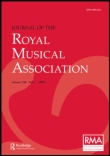
JOURNAL OF THE ROYAL MUSICAL ASSOCIATION
Fostering scholarly insights in music studies.JOURNAL OF THE ROYAL MUSICAL ASSOCIATION, published by Cambridge University Press, stands as a significant repository for innovative research and scholarly discourse within the field of music studies. Recognized for its contributions to the understanding of musical practices, theory, and history, this esteemed journal offers a platform for academics and researchers to disseminate their findings to a broad audience. With an ISSN of 0269-0403 and E-ISSN of 1471-6933, the journal has maintained a notable presence since its inception, merging insights from both traditional and contemporary musicology. It currently occupies a Q4 ranking in Music within the Scopus database, reflecting its inclusion within the arts and humanities landscape. While the journal traditionally operates under subscription access, its continuing commitment to advancing music scholarship ensures that it remains an essential resource for students, scholars, and practitioners alike, fostering greater understanding and appreciation of musical artistry from 1987 to the current era.

Muzikoloski Zbornik
Exploring the Depths of Musical HeritageMuzikoloski Zbornik is a prominent open-access journal in the field of musicology, published by the esteemed University of Ljubljana Press since 1965. Hailing from Slovenia, this journal has been dedicated to advancing the study of musical heritage, theory, and practice, serving as a vital platform for researchers, professionals, and students alike. With a notable Q2 category ranking in the field of music and a Scopus ranking of 109 out of 180 in Arts and Humanities, Muzikoloski Zbornik showcases high-quality research, fostering discourse and collaboration among scholars globally. The journal embraces a diverse range of topics, from ethnomusicology to music education, ensuring its relevance in an ever-evolving academic landscape. By providing unrestricted access to its content, it champions the dissemination of knowledge and supports the growth of the musicology discipline.

RIVISTA ITALIANA DI MUSICOLOGIA
Illuminating the Path of Musicological ResearchRIVISTA ITALIANA DI MUSICOLOGIA, published by the Italian Society of Musicology, is a distinguished journal dedicated to the field of musicology, offering a platform for scholarly research and discourse on a wide array of musical topics. With an ISSN of 0035-6867 and an E-ISSN of 2036-5586, this journal has contributed significantly to the understanding of music in cultural and historical contexts. Although the scope of coverage was marked from 2003 to 2008 in renowned databases like Scopus, the journal continues to serve as an invaluable resource for researchers, educators, and students embroiled in music studies. Its emphasis on rigorous research and critical analysis makes it a vital asset for anyone seeking to deepen their knowledge of musicological inquiry. While not an open-access publication, the RIVISTA ITALIANA DI MUSICOLOGIA remains a prestigious outlet for scholarly contributions that reach audiences eager to explore the complexities of musical heritage.

Musicologist
Advancing Music Knowledge Through Innovative ResearchMusicologist is a premier academic journal dedicated to the exploration and analysis of music theory, history, and practice, published by the esteemed Trabzon University State Conservatory in Turkey. With an ISSN of 2618-5652, this journal has been a vital platform for scholars since its inception in 2019, reflecting a commitment to fostering innovative research in the field of music. Recognized for its quality, the journal currently holds a Q2 ranking in the music category for 2023, placing it within the top segments of its discipline, as evidenced by its position at #72 out of 180 in the Scopus rankings, representing the 60th percentile. Although the journal employs a traditional publication model, it serves as a crucial repository for contemporary musicological discourse, aiming to advance knowledge and understanding within a vibrant academic community. Musicologist is not only a resource for seasoned researchers but also an invaluable tool for students and professionals alike, nurturing a comprehensive appreciation of music as an art form and scholarly pursuit.
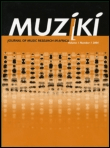
Muziki-Journal of Music Research in Africa
Advancing Scholarship in African MusicologyMuziki - Journal of Music Research in Africa is a leading publication dedicated to exploring the rich tapestry of music research across the African continent. Published by Routledge Journals, Taylor & Francis Ltd, this journal has been at the forefront of scholarly discourse since its inception in 2004, providing a platform for innovative and interdisciplinary approaches to the study of music. With an ISSN of 1812-5980 and E-ISSN of 1753-593X, it ensures wide accessibility to both print and digital audiences. As of 2023, it holds a prestigious Q3 ranking in the field of Music, reflecting its commitment to quality scholarship and the promotion of diverse musical narratives. Muziki is particularly invaluable for researchers, professionals, and students seeking to deepen their understanding of African musicology and its socio-cultural relevance. The journal publishes original research articles, reviews, and critical essays, highlighting contemporary developments and historical contexts in music research. With a Scopus rank of 59/180 in the Arts and Humanities Music category, it stands as a respected source for advancing knowledge and fostering dialogue within the global music community.
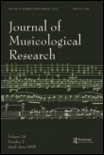
JOURNAL OF MUSICOLOGICAL RESEARCH
Fostering Scholarly Dialogue in Music StudiesJOURNAL OF MUSICOLOGICAL RESEARCH, published by Taylor & Francis Ltd, is an esteemed platform that delves into the field of musicology, contributing to the ongoing dialogue in music research and scholarship since its establishment in 1979. With an ISSN of 0141-1896 and an E-ISSN of 1547-7304, this journal serves as a vital resource for researchers, professionals, and students, offering insights into diverse musicological topics. Although currently categorized in Q4 in Music with Scopus rankings placing it at #110 out of 180 in the Arts and Humanities field, its commitment to excellence and broader discourses in music studies is evident. The journal does not have Open Access options, yet it provides accessible content through reputable academic channels, fostering scholarly exchanges within the community. It aims to publish high-quality research that advances understanding of musical practices and cultural implications, making it a critical resource for those passionate about music and its myriad influences.
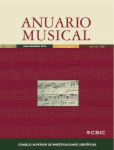
Anuario Musical
Showcasing groundbreaking research in the arts.Anuario Musical, with its ISSN 0211-3538 and E-ISSN 1988-4125, is a prestigious journal in the fields of Music, Visual Arts, and Performing Arts, published by CONSEJO SUPERIOR INVESTIGACIONES CIENTIFICAS-CSIC in Spain. Since becoming an Open Access journal in 1995, it has played a crucial role in disseminating cutting-edge research and fostering scholarly communication in these dynamic disciplines. The journal has achieved notable rankings in the 2023 category quartiles, being placed in Q2 for Music and Q1 for Visual Arts and Performing Arts, reflecting its commitment to high-quality scholarship. Furthermore, it is indexed in Scopus with respectable ranks—#294/667 in Visual Arts and Performing Arts and #105/180 in Music—underscoring its relevance in the global academic landscape. Between 2011 and 2023, Anuario Musical has published a diverse range of articles that contribute significantly to the understanding and appreciation of music and the arts, making it an essential resource for researchers, professionals, and students alike. For more details, the journal is based at Editorial CSIC, C/VITRUVIO 8, 28006 MADRID, SPAIN.

Oido Pensante
Exploring the Soundscape of Cultural StudiesOido Pensante is a prominent open-access journal dedicated to the multifaceted field of music, published by the esteemed University of Buenos Aires, specifically through its Faculty of Philosophy and Letters, Institute of Anthropological Sciences. Since its inception in 2013, this journal has fostered a rich platform for scholarly discourse and innovative research at the intersection of music and cultural studies. With an ISSN of 2250-7116, Oido Pensante aims to bridge theoretical frameworks and practical applications, making significant contributions to the understanding of music in its social context. Currently, it holds an impressive Q3 ranking in the Arts and Humanities – Music category for 2023, with a Scopus rank of #99 out of 180 journals, reflecting its commitment to academic rigor and relevance. The journal's open access policy ensures that research is widely disseminated and accessible, making it an invaluable resource for researchers, professionals, and students alike in Argentina and beyond. With converged years from 2017 to 2024, Oido Pensante continues to expand its reach, encouraging intellectual exchange and stimulating dialogue within the music community.
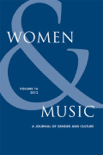
Women and Music-A Journal of Gender and Culture
Celebrating the Rich Tapestry of Women in MusicWomen and Music: A Journal of Gender and Culture is a pioneering academic journal published by University of Nebraska Press, focusing on the intersection of gender and music. With a commitment to exploring issues pertinent to women and music in a range of cultural contexts, this journal provides a critical platform for scholars, musicians, and educators to share research that enriches our understanding of gender dynamics within the music industry and music's role in society. While currently not an open-access journal, it aims to make significant contributions to gender studies, cultural studies, and musicology, attracting a dedicated readership from various backgrounds. The journal is essential for those interested in feminist musicology and gender representation in the arts, fostering discourse that challenges traditional narratives and promotes inclusive scholarship. By bringing together diverse perspectives and innovative research, Women and Music continues to push boundaries and foster important conversations within both academic and artistic communities.
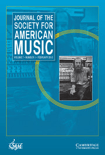
Journal of the Society for American Music
Illuminating the Cultural Contexts of American MusicThe Journal of the Society for American Music is a leading academic journal dedicated to the study of American music and its diverse cultural contexts. Published by Cambridge University Press, this journal serves as a vital platform for researchers and professionals in the fields of musicology, ethnomusicology, and American studies, contributing significantly to scholarly discourse and advancing knowledge in these areas. With an impressive impact factor reflecting its academic rigor, it is placed in Q2 of the music category as of 2023 and ranks #55 out of 180 in the Arts and Humanities segment, placing it in the 69th percentile among its peers. Since its inception, the journal has published a wealth of articles, reviews, and critical studies that explore the rich tapestry of American musical traditions from historical and contemporary perspectives. It operates under a subscription model, ensuring a wide distribution and accessibility to its important findings. Researchers, students, and professionals alike will find the journal an essential resource for advancing their understanding of the dynamic landscape of American music.